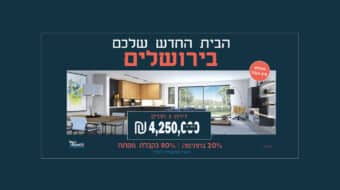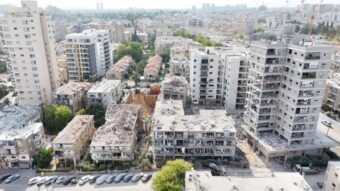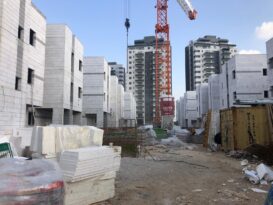The average mortgage in Israel rose to NIS 1.06 million in May, a 12% increase and NIS 114,000 in the average mortgage amount compared to January of this year. The average mortgage for a discounted apartment through the government-subsidized “Dira B’Hanacha” lottery program stood at NIS 954,000 in May. Furthermore, 44% of mortgages were taken at a leverage level above 60%.
By Dror Neer Kastel, Nadlan Center
The average mortgage in Israel stood at NIS 1.06 million in May, according to data published on Monday by the Bank of Israel. This marks the fourth consecutive month of increase, up from NIS 1.02 million in April and NIS 946,000 in January. This represents a 12% jump in the average mortgage over just four months. Compared to last year, it reflects a 6% rise—the average mortgage in May 2024 was approximately NIS 1 million.
The average mortgage in discounted housing projects (Dira B’Hanacha) reached NIS 954,000 in May, compared to NIS 797,000 in April and NIS 775,000 in March. The share of mortgages taken at high risk—defined as loans exceeding 60% of the property’s purchase price—stood at 44% in May, slightly lower than April’s 45% but similar to the rate in May last year.
In March, a draft temporary directive was published stating that banks would be required to allocate additional capital for projects in which more than 25% of the apartments were sold under 20/80 payment terms. It also stipulated that balloon loans funded by contractors must not exceed 10% of the total residential loans issued by the banks. These restrictions are valid through the end of 2026. Although the rules took effect in early April, a recent Nadlan Center review of various sales promotions shows that many companies continue to offer 20/80 deals—and sometimes even 10/90—despite the limitations.

Nadlan Center is Israel’s leading real estate news and knowledge platform in Hebrew, created for industry professionals. Founded by experts in the field, it delivers in-depth, up-to-date coverage on urban renewal, planning and construction, taxation, and housing policy — tailored to the needs of developers, investors, planners, and financiers. In addition to its widely read news content, Nadlan Center hosts major industry events, professional conferences, and training programs that support the growth and development of the Israeli real estate sector.
Learn more: https://www.nadlancenter.co.il







